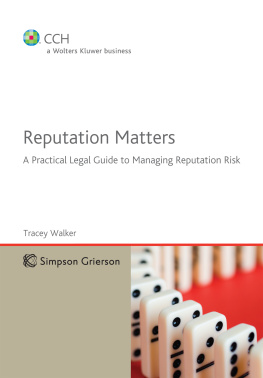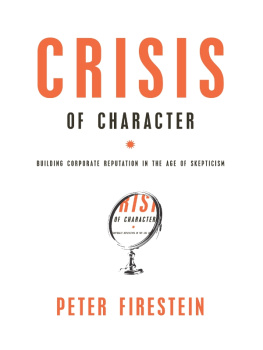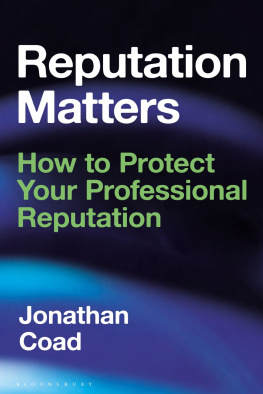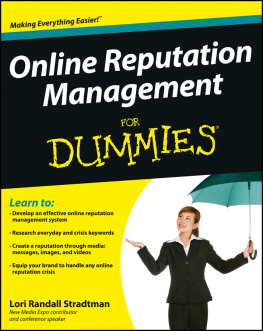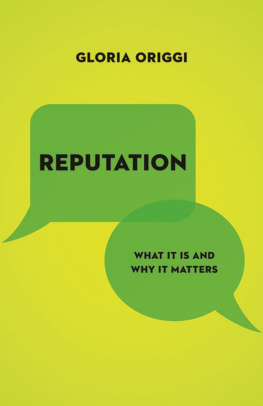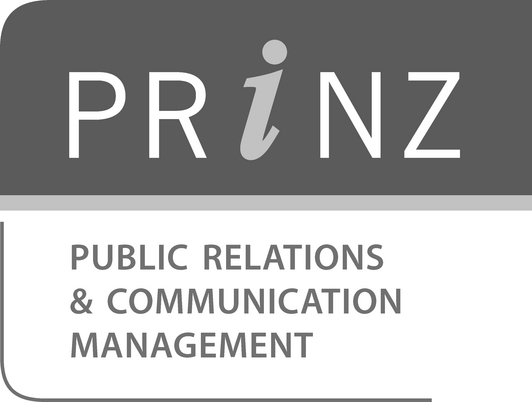About CCH New Zealand Limited
CCH New Zealand Limited is a leading provider of accurate, authoritative and timely information services for professionals. Our position as the professionals first choice is built on the delivery of expert information that is relevant, comprehensive and easy to use.
We are a member of the Wolters Kluwer group, a leading global information services provider with a presence in more than 25 countries in Europe, North America and Asia Pacific.
CCH The Professionals First Choice.
Enquiries are welcome on 0800 500 224.
National Library of New Zealand Cataloguing-in-Publication Data
Walker, Tracey, 1964
Reputation matters: a practical legal guide to corporate communications / Tracey Walker.
Includes index.
ISBN 978-0-86475-923-8
1. Public relations and lawNew Zealand. 2. Corporations
Public relationsNew Zealand.
343.93099dc 23
2012 CCH New Zealand Limited
Published by CCH New Zealand Limited
Published: August 2012
All rights reserved. No part of this work covered by copyright may be reproduced or copied in any form or by any means (graphic, electronic or mechanical, including photocopying, recording, recording taping, or information retrieval systems) without the written permission of the publisher.
Foreword
Reputation risk management is a relatively new concept that provides a persuasive model to help embattled CEOs when their conscience and gut instinct conflict with the advice of their lawyers.
Reputations have never been more exposed, thanks to the emergence of armies of citizen journalists, bloggers and campaigners using new social media channels without the traditional need for balance.
To survive in this world, organisations must know what people think about them, and must actively manage expectations of services and products. They need to manage an issue so it does not develop into a crisis.
The number of businesses suffering reputational crises is on the rise. In recent history, there have been numerous examples featuring companies, directors, CEOs, political parties (and representatives), and media and sporting personalities.
In the past, and still today, many lawyers would advise a company not to admit to any fault when something goes seriously wrong, like a major incident that takes lives or destroys property. The problem is that it is obvious to everyone else, including customers, that the organisation was responsible for the disaster but not necessarily to blame for it.
Organisations are now expected to take the moral responsibility to fix an issue or a crisis. Blame can be attributed later once the situation has been brought under control.
To take a simple and dramatic example an airline crash that results in the death of hundreds of passengers. Usually the cause is unknown, maybe for many months.
Today, public consensus is there is no question of how the airline should behave: they must express their sorrow and concern and demonstrate this by caring for relatives. This might mean flying them to the nearest city to the crash site, paying all their expenses, and generally doing all they can to help those affected. They work with the police, accident investigation authorities and victims support, and pledge publicly to do all they can to find out what happened.
But there was a time when even airlines did not do this. Pan Am, now defunct, did not send a representative to Lockerbie when their flight 103 from Frankfurt was bombed from the sky in December 1988, killing 270 people including 11 residents of the small Scottish town.
All specialists in corporate crisis communication have stories of fighting with legal advisors over how their clients should react and speak. Usually the fight is at its worst at the beginning of the crisis. The communicator has a mantra tell it all, tell it fast and tell the truth. Get the worst news over with as fast as you can, do not leave out anything that will allow the story to run longer than necessary, and do not say anything that is not 100% true, because you will be found out. The hoary clich communication specialists work at the bar of public opinion and it is a lot less forgiving than your law court has much truth in it.
It is a truth that lawyers are beginning to understand better. Effective client counselling now involves both the communication and legal teams working together to develop the organisations response strategy drawing off the powers both disciplines offer.
CEOs now say that reputation is the prime asset of any organisation, and a whole new professional approach is developing to help companies get to grips with what is still a largely nebulous concept. According to a recent survey 92% of New Zealand CEOs say that corporate reputation is a prime asset, although 80% of them regard reputation as their greatest risk. Media representatives surveyed at the same time thought that companies were poor at handling crises.
The 2009 Managing Reputation survey by Senate Communications and Baseline Consultancy revealed that CEOs and senior media believe the key factors determining good reputation management are:
- senior executives responding to issues and being accessible
- the organisation demonstrating quick reactions to events
- openness of answers.
While there will always be a steady stream of corporate crises, many of which could have been mitigated by a rapid and open response by the companies concerned, at least CEOs are more aware that it could be them under the public spotlight next.
However, the majority surveyed in New Zealand, matched by earlier surveys worldwide, suggested that they found managing reputation under pressure was very difficult. One reason might be that nearly half of their organisations do not even discuss reputation on a regular basis in fact, only when something was going wrong.
Reputational damage can be significant from an image, financial and human capital perspective. It sends customers running to the competition, it leads shareholders to sell up, staff to leave (or not join), it creates significant financial costs (fixing the situation, compensation lawsuits, etc) and, of course, in extreme cases, to chairman, directors and CEOs losing their jobs.
Enlightened boards and CEOs put reputation on their monthly board agenda and build reputation risk management into day-to-day planning, as well as their crisis planning. This ensures that, not only is day-to-day business well managed, but regular crisis simulation exercises become the norm for the business. The question: how would this affect our reputation? is asked consistently, not just after the proverbial hits the fan!.
And of course, enlightened organisations ask their legal team to work closely with their communications team to build, and protect, their reputation.
Neil Green, Public Relations Institute of New Zealand (PRINZ) member
The legal framework in which communicators operate is crucial to effective reputation management. This comprehensive, solution-orientated guide provides a straightforward overview of the New Zealand context. It highlights the importance of collaboration between professionals in complex situations, where reputation really does matter. Jane Dodd, PRINZ President

